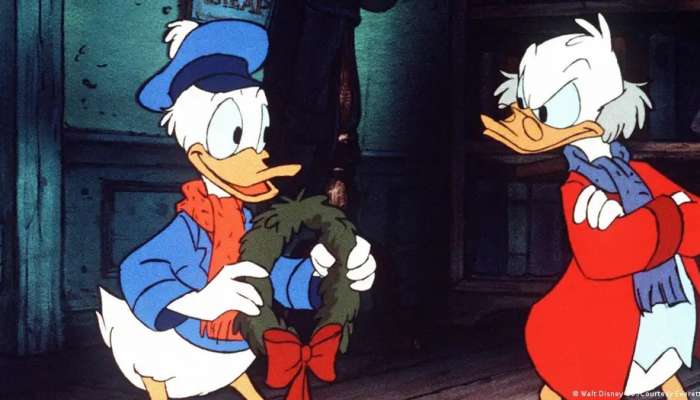
New York: With feathers that can be easily ruffled, Donald Duck can be proud, angry, arrogant and yet oddly charming — and apologetic when he harms others, including nephews Huey, Dewey and Louie.
He was once described by Walt Disney as the "problem child" of his animation company's stable of lead characters that include Pluto, Goofy and Mickey Mouse. But in the end, he appeared in more Disney short films, movies and series — which expanded into a whole Donald Duck "universe" — than any of his animated colleagues.
Five highlights from a legendary cartoon career.
1. Humble beginnings
An anthropomorphic duck with indecipherable speech who is dressed in a sailor outfit — but without pants — Donald Duck burst onto the big screen in 1934 with a cameo in the short cartoon, "The Wise Little Hen." Here the idle duck lays the platform for his future misadventures as he does everything to avoid helping mother hen to plant corn.
That year Donald became an irritated, hotheaded foil to Disney star Mickey Mouse in an "Orphans Benefit" cartoon, kicking off decades of rivalry with cute cartoon icon, Mickey.
Three years later in 1937, Donald took top billing for the first time in short cartoons like the Mexico-set "Don Donald," where viewers are introduced to his love interest Daisy Duck; and "Modern Inventions," where the heard-headed duck is frustrated in a world run by robots.
He went on to star in several feature films, including "Chips Ahoy" (1956), "Mickey's Christmas Carol" (1983) and the 1999 musical "Fantasia 2000," a sequel to the Disney classic from 60 years before.
2. A hot-tempered hardhead — if a little unlucky
In those first few starring roles, Donald Duck cemented his down-on-his luck, impatient persona as he struggled to stay afloat doing odd jobs in the fictional town of Duckberg.
He often begins a film in a cheerful mood, and a strangely positive outlook on life. But things inevitably go wrong for the feathered anti-hero.
That bad luck might be why Donald's birth date was sometimes given as Friday the 13th in films like "Three Caballeros" (1944) — where Donald Duck sets off with two birds for misadventures across Latin America.
In the end, however, the angry, frustrated yet loving Donald Duck became one of the most popular stars in the Disney stable.
3. Anti-fascist Duck wins Oscar
In the Second World War-era short animation "Der Fuehrer's Face" (1943), Donald Duck plays a bumbling, naive and reluctant Nazi who is woken by an oom-pah band comprising fascist leading-lights of the time like Germans Heinrich Himmler, Joseph Goebbels, Hermann Göring, Japanese leader Hideki Tojo and Italian Benito Mussolini.
Forced to work at breakneck speed in a German munitions factory, the heil-Hitlering Donald struggles to embrace the totalitarian dream. The anti-Nazi propaganda film won the Oscar for Best Animated Short Film that year, which would be the first for a film featuring the sailor shirt and cap-wearing animation star. His films were nominated eight times.
4. Donald Duck universe
Donald Duck has inspired many Walt Disney spin-off series, films and related characters who together form an unofficial "duck universe."
From Daisy Duck to Scrooge McDuck, and of course Huey, Dewey, and Louie, Donald Duck's extended family were the subject of TV series "DuckTales" (1987–1991), which also has a 2017-2021 reboot, and video games such as "Goin' Quackers" (2000).
Donald Duck's universe of quack content is most often set in the town of Duckberg, including "DuckTales" and the 1990s animated series, "Quack Pack."
Many Europeans are familiar with the Donald Duck pocket books that are mainly produced in Italy and are particularly popular in Germany as the "Lustige Taschenbücher," where they have been published on a regular basis since 1967.
5. Hollywood Walk of Fame
In 2004, Donald Duck got his own star on the Hollywood Walk of Fame. He followed in the footsteps of Mickey but beat Minnie Mouse to a spot on the Walk that also honors Disney character Snow White.
"He has brought tremendous joy and laughter to people around the world, with his charm and explosive temper tantrums," said Disney CEO Michael Eisner as Mickey, Pluto, and Daisy stood in attendance.
Conferred on the animation icon's 70th birthday, it was a vindication of Donald Fauntleroy Duck's star power that has not waned as he turns 90.